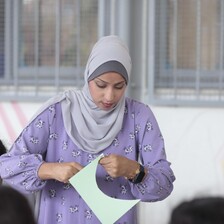The Electronic Intifada 18 March 2024

People in Gaza have to decorate their tents rather than their homes this Ramadan.
APA imagesThe people of Gaza had hoped that the genocidal war would stop before Ramadan.
Everybody needed to feel safe, to have food and water and to move through the streets without fearing explosions.
An estimated 1.7 million displaced people had hoped they could return to their homes and inspect what was left of them.
They had hopes, too, of being reunited with neighbors and friends.
None of these hopes have been realized.
Gaza is still under a relentless Israeli attack. Hunger is worsening.
For so many people, the first week of Ramadan has been spent in tents. The atmosphere of this special month is missing.
Salim al-Masri, 40, has been uprooted from Gaza City. He is now in al-Mawasi, southern Gaza.
“There are no words to express the sadness in our hearts,” he said.
He reminisces about how he celebrated Ramadan in the past.
He decorated every room in his home so that everyone who entered it could feel cheerful. And he meticulously planned the meals that preceded and followed the daily fasts.
“I would spend hours in the streets where the markets were,” he said. “My children would run in between the shops.”
“All of this was taken away from us because of the war,” he added. “I feel like I am suffocating here, sitting in this tent. It’s a small space – not big enough for me, my wife and the children.”
While he previously took pride in having a table brimming with various dishes for his family at Ramadan, prices are now so high that “I cannot even provide them with one type of food.”
“Scattered”
Wafa Akar, 52, is from the city of Khan Younis in southern Gaza. Her home has been destroyed and she laments how she will not be able to prepare meals as she traditionally did during Ramadan.
After being displaced, she is now further south in Rafah – near the border with Egypt.
“I will never get used to living in a tent,” she said. “The tent is full of sand and I have no privacy.”
“I have no kitchen or kitchen utensils,” she added. “And I have no food – apart from canned food, which I don’t like to eat.”
She is especially sad that she cannot spend time with her grandchildren this Ramadan.
“We are all scattered,” she said.
Jude Barbakh, 12, is from Gaza City but now living in al-Mawasi.
She recalls going to school feeling sleepy at Ramadan “because I used to stay up all night.”
Once darkness fell, she would buy ice cream and other treats. She was especially fond of samosas.
“I used to compete with my friends to see who had the most beautiful decorations in their house,” she said.
“I miss everything,” she added. “Being in a tent is like being in prison.”
Ruwaida Amer is a journalist based in Gaza.





